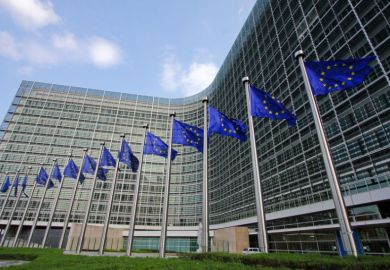Ursula von der Leyen’s successful election for a second term as president of the European Commission was based on her carefully calibrated policy guidelines, which will now form the commission’s road map for the next five years.
The section on research and innovation is part of the most detailed area, entitled “sustainable prosperity and competitiveness”. But the guidelines cover everything from democracy and strengthening Europe’s social model to Europe’s place in the world and security and defence. And the university sector needs to engage with all of it.
Promising a “new era of innovation and ingenuity”, the commission president promises an increase in research spending, directed at strategic priorities, fundamental research and innovation. This is linked to an explicit commitment to boost funding for both the European Research Council and the European Innovation Council – and it is critical to acknowledge this endorsement at the highest level of the commission.
Among her strategic priorities, von der Leyen explicitly underlines her desire for Europe to be a global leader in biotechnologies. This would be supported not just by increased spending, but also by legislation designed to help translate research to implementation and market application. Indeed, the guidelines promise a wider strategy for the European life sciences, to closely align with the EU’s green and digital transitions.
Von der Leyen wants Europe to be a “global leader” in AI innovation and commits to setting up a European AI Research Council, whereby the continent can pool its resources for maximum effect, just as it does with other research infrastructures such as Cern (the European Organisation for Nuclear Research). Flanking this, she urges the diffusion of digital technologies, from healthcare to our energy systems, from rail ticketing to border management.
In health, von der Leyen proposes legislation to ensure the EU’s resilience in critical medicines, as part of a drive towards a European Health Union. She emphasises the need for more preventative healthcare and reaffirms her commitment to mental health.
Her economic and social priorities include an emphasis on skills, through greater emphasis on STEM education and Erasmus+. She proposes more collaboration between research, education and innovation, and it is interesting that she sees this nexus through the European University alliances, rather than through the European Institute of Innovation and Technology, where it currently sits.
But the passages explicitly focusing on research, innovation and education only take up about 3 per cent of von der Leyen’s guidelines. As universities, we must strive to make ourselves heard in the other 97 per cent, too.
For instance, given the commission’s focus on the EU’s technological and industrial transformation, we need to spell out the practical ways to make this happen, which must also include blue-skies research with low technology readiness levels. How do we sustain the pipeline of entirely new discoveries, which are not yet in any politicians’ sights? We must find a way to underline our capacity to support policymakers’ needs, with a richness and comprehensiveness that only universities can deliver.
Moreover, we must articulate effectively our important stake in many of the commission’s key proposals. Universities are critical to strengthening resilient public institutions, fostering debate and helping society come to terms with technological transformation. And Europe’s global research position can be assured if university researchers gain full access to clinical data through a truly borderless and comprehensive European Health Data Space.
Much progress can also come through simple revisions to the EU Data Act and other data regulations to facilitate access to, and reuse of, data – including data held by companies – for research purposes in the public interest (such as on the spread of misinformation on social media platforms).
Universities also have a central role to play in supporting EU candidate member countries, such as in strengthening science collaboration or forging closer intercontinental bonds (as is happening through the European Universities initiative). And we must insist that we are an indispensable element of the EU’s ambitions to foster close, equitable and sustainable partnerships abroad.
Finally, when von der Leyen introduced the guidelines in her July speech to the European Parliament, she did not hide the accelerating social and political discord expressed in the European – and other recent national – elections. Overcoming growing hostility against science and evidence, when free debate is increasingly curtailed through misinformation and attacks on academic freedom, challenges universities and policymakers alike.
Together, we need to recapture the public imagination about the benefits of science, making universities – and science – not harbingers of unsettling changes to personal life choices, but of societal welfare (of which economic transformation is only a part). Simply doing more citizen science will not do the trick; the Netherlands has been a model for doing a lot of citizen science and broad public engagement on research priorities, but that did not prevent pro-science parties from doing poorly in recent elections.
As universities, we are uniquely poised to bring together the different priorities of the next commission. We can help bridge a central tension in von der Leyen’s guidelines between economic progress and social fairness. And we can help policymakers reflect on how their competitiveness goals impact on the well-being of Europe’s citizens.
If we succeed, Europe’s research, innovation and higher education can maximise its global potential – at the heart of an energised Europe.
Jan Palmowski is secretary general of the Guild of European Research-Intensive Universities.
Register to continue
Why register?
- Registration is free and only takes a moment
- Once registered, you can read 3 articles a month
- Sign up for our newsletter
Subscribe
Or subscribe for unlimited access to:
- Unlimited access to news, views, insights & reviews
- Digital editions
- Digital access to THE’s university and college rankings analysis
Already registered or a current subscriber?









